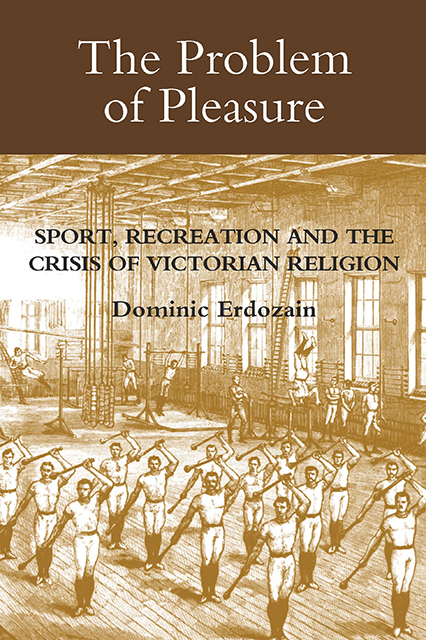Book contents
- Frontmatter
- Contents
- List of Illustrations
- Acknowledgements
- Abbreviations and Note on Conventions
- Introduction
- 1 ‘Born Free and Everywhere in Chains’: Evangelicalism and the Problem of Pleasure
- 2 Romanticism With Boots on: The Virtues of Sport
- 3 Renegotiating the Secular: The Coming of Recreation to the Mid-Victorian Religious World
- 4 ‘We are all Cyclists Now’: Applying the Pleasure Principle
- 5 Sport and the Secularisation of Late-Victorian Youth Ministry
- 6 Contesting the Sacred: The Late-Victorian Church and the ‘Gospel of Amusement’
- Conclusion
- Bibliography
- Index
2 - Romanticism With Boots on: The Virtues of Sport
Published online by Cambridge University Press: 02 March 2023
- Frontmatter
- Contents
- List of Illustrations
- Acknowledgements
- Abbreviations and Note on Conventions
- Introduction
- 1 ‘Born Free and Everywhere in Chains’: Evangelicalism and the Problem of Pleasure
- 2 Romanticism With Boots on: The Virtues of Sport
- 3 Renegotiating the Secular: The Coming of Recreation to the Mid-Victorian Religious World
- 4 ‘We are all Cyclists Now’: Applying the Pleasure Principle
- 5 Sport and the Secularisation of Late-Victorian Youth Ministry
- 6 Contesting the Sacred: The Late-Victorian Church and the ‘Gospel of Amusement’
- Conclusion
- Bibliography
- Index
Summary
Victorian history is the story of the English mind employing the energy imparted by Evangelical conviction to rid itself of the restraints which Evangelicalism had laid on the sense and the intellect; on amusement, enjoyment, art; on curiosity, on criticism, on science….
Sport – a word that conjured images of contemptible dissipation in 1830 – was reinvented in the period after 1850. That it was not only accepted but grafted into a leading role in the Victorian assault on irreligion can only be described as revolutionary. Like most revolutions, however, this was a process rooted in that which it opposed. There was a degree to which the evangelical embrace derived from the earlier policy of denial and opposition. By reifying the spiritual enemy into a set of dissolute pastimes, and sacralising the safe territory of the home, evangelicals prepared the ground for cautious raids into the contested terrain of leisure. Like an army sucked into a battle on their opponents’ terms, they drifted towards a policy alien to their instincts. Yet there was also an ideological dimension to the great turn to recreation – a strategic rather than merely tactical engagement, so brazen in its uses of the flesh it was instantly dubbed ‘Muscular Christianity’. This was a movement that lent itself to mockery but, as Maurice Cowling observed of its leading representative, Charles Kingsley, there was a ‘hard core of positive intellectuality’ beneath the ranting and the hyperbole. It could be summarised as the conviction that ‘God created the world, we live in it, it is unworthy – even blasphemous – to deny the fact.’ Or as the Nonconformist and long-time campaigner for leisure, George Dawson, defined the wider liberal impulse in 1848: ‘To get religion out of the pale of the chapel into the fresh air of heaven and give it full exercise in that world which it came to beautify and animate’.
The phrase ‘muscular Christianity’ was supposed to put an end to the profane project of enlisting the body in the service of the gospel. The sobriquet implied that nothing could be more absurd than to juxtapose sacred and secular in such proximity. The term was intended to carry a degree of sexual shame and reproach.
- Type
- Chapter
- Information
- The Problem of PleasureSport, Recreation and the Crisis of Victorian Religion, pp. 85 - 112Publisher: Boydell & BrewerPrint publication year: 2010



